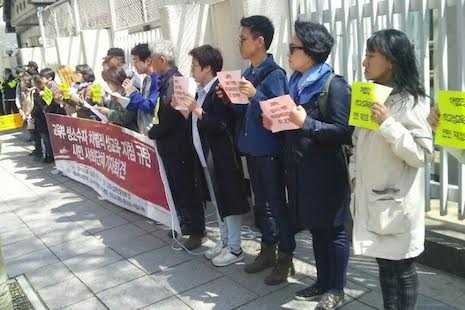
Demonstrators in Seoul take part in a protest against the Ministry of Education's policy on sex education guidelines for schools (Photo courtesy of the LGBTQ Youth Crisis Support Center)
It wasn’t until Jeong Min-seok entered his second year of high school, aged 18, that he realized he was gay. Even then, he wasn’t sure what that meant. When he turned on the television in early 1990s South Korea, he was told that being transgender meant the same thing.
“But I don’t want to become a woman,” Jeong recalled thinking at the time. “I must not be gay.”
Twenty years later, Jeong is at the forefront of the latest in a long line of social policy battles between South Korea’s LGBT (lesbian, gay, bisexual, transgender) activists and evangelical Christians: what to teach children about sexual minorities at school.
“Because teachers can’t talk about these things, students can’t get information and think that they have no LGBT friends among those around them,” said Jeong, who runs the Seoul-based LGBTQ Youth Crisis Support Center, the only facility of its kind in the country.
In March, the Ministry of Education provided sex education guidelines to schools for the first time in a bid to standardize the curriculum. The guidelines expressly forbid any mention of homosexuality, a concession to intense lobbying by local Christian groups.
After a backlash from LGBT activists and some educators, the ministry revised the wording: homosexuality would now simply “not be included” in the curriculum, a change that critics blasted as meaningless.
In defending its exclusion of any reference to sexual minorities, the ministry has argued that homosexuality is not the “prevalent situation” as far as sexual values are concerned.
Early this month, the controversy was picked up on the international radar when Human Rights Watch accused the government of sending a “pejorative, intolerant message to the youth of South Korea” and violating “basic rights to information, health, and education”.
As someone who was bullied over his sexuality at school, Jeong believes it’s crucial for students to be taught about the diversity of sexual orientation and identity.
“If you look at the data, the amount of bullying, abuse and violence is really high,” he said, adding that schools had changed little since his time in how they treat sexual minorities. “This is the reality in Korea, and I think reducing this is the most urgent task.”
The possible consequences of such harsh treatment are hinted at in alarming data about the mental health of LGBT youth. In a survey of sexual minorities carried out by activist group Chingusai last year, about 45 percent of the more than 600 respondents aged 18 or under said they had attempted suicide.
While the Education Ministry has claimed to be approaching the issue of sexual orientation from a human rights perspective, Jeong sees the guidelines as effectively ostracizing youth who differ from their peers.
“I think what it’s saying is: Don’t talk about it, be silent, don’t talk about your worries, don’t come out to your friends.”

Jeong Min-seok (center) sits with collegues at the LGBTQ Youth Crisis Support Center in Seoul (Photo courtesy of the LGBTQ Youth Crisis Support Center)
South Korean society is generally negative toward deviations from traditional sexual norms (just 39 percent of South Koreans said that homosexuality should be accepted by society in a Pew poll in 2013), but it was a backlash from conservative Protestants that scuppered an earlier, more inclusive draft of the guidelines unveiled last year.
Protestant denominations claim about 20 percent of the population among their members, forming a formidable political lobby.
“I think the bottom line is that our insistence is like the Bible says, that homosexuality is [a] sin. So we have normative principles about that,” a spokesman for the Christian Council of Korea (CCK) told ucanews.com on condition of anonymity.
The CCK, the country’s largest organization of Protestant churches, has been a prominent opponent of including LGBT material in the education curriculum.
“We think homosexuality, or same-sex marriage or LGBT things are harmful for the system of marriage,” the spokesman said. “We think it’s not natural.”
He added their concern is also related to the age of students receiving sex education.
“We think they are still teenagers, not fully grown adults, so they might be affected by that kind of distorted ‘sex education,’ from the CCK’s perspective,” he said.
He acknowledged that the organization has close connections to political circles. Typically, the prime minister and leaders of the ruling and opposition parties have often visited the organization, he said.
“I think Korean society in general is quite conservative,” he said. “So still.... I think more people are against homosexuality. And then Christians are even more strongly against that issue.”
While survey data bears this out, the Pew figures from 2013 also show more than 70 percent of 18-29 year olds to be in favor of societal acceptance of homosexuality. Among all age groups, the number of people who agreed more than doubled from 2007, signaling a massive shift in public perceptions.
Yet, for now at least, groups like CCK remain on the winning side of a debate that looks set to rage on into the future.
Wherever that debate leads, Jeong will undoubtedly be in the thick of it, fighting the idea that young people should conform to one conception of sexual identity.
“It’s really wrong and dangerous,” he said. “I want to say, it’s important that it changes fast.”


